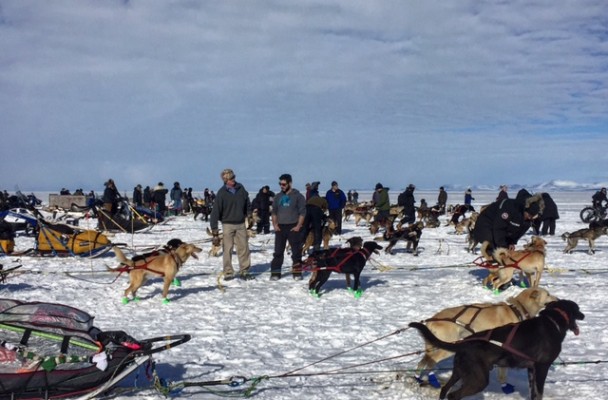The small community of Ambler was buzzing all day as dog teams pulled in for a rest roughly 200 miles into the Kobuk 440. The community gave mushers a warm welcome serving up platefuls of French toast, sheefish and all kinds of other treats. But dog teams have roughly 240 miles of travel ahead and it’s still anybody’s race.

As the mid-morning sun beat down over Ambler a group of local kids helped haul drop bags and straw for Katherine Keith and Noah Burmeister.
The two mushers arrived within a half hour of each other in the tiny Northwest Arctic village. Keith told her competitor she was sure he’d eventually pull ahead of her team.
“Who’s going to win the race?” Keith asked. “Your dogs. You’re still in front of me.”
Both mushers set about feeding and bedding down their teams. Despite dropping a dog in Selawik, Burmeister says he’s pleased with how his team is running so far.
“I like how they’re looking,” Burmeister said. “They’re cruising along real nice so, I’m just looking ahead. I’ll worry about what’s behind me if they pass me.”
Katherine Keith said she’s also pleased with her team’s performance.
“I love these guys, they’ve got great attitudes,” said Keith. “I think that’s just so important in a race, so I love it!”
Keith and partner John Baker recently bought out a kennel run by Kelly Maixner in Big Lake, so she’s still getting to know her dogs. She arrived in Ambler in third place, but she said she’s not convinced she can hold on to that spot.
“There’s a lot of nice teams here… I can’t really quite yet predict who’s going to win…,” said Keith.
From Selawik, teams traveled more than 80 miles to Ambler. Keith said the trail was soft and punchy in places.
“But what I’m hoping is here and through Kobuk, there’s going to be such a good snowmachine, that it should be nice easy travelling conditions, but I think here overland to Selawik it’s not as commonly travelled, so that’s why it was a little mushy,” Keith said. “But it’s good it kind of levels out the playing field, so teams that are going to do good in this race are teams that are not just good travelers but teams that can work a little too.”
In front of Keith, is the rough-mannered Frenchman, Sebastien Vernaud. When his team checked in at Ambler, it was clear they still had plenty of gas in the tank.
Vernaud says he didn’t run into other teams along the trail overnight and he’s not concerned about what’s in front or who’s behind him.
“It’s not so important the place for me,” said Vernaud. “It’s that building a team. They’re young. Most of them are 18 months old, so it’s a good learn for them.”
The stop in Ambler was well-timed. Half the field arrived before the sun rose high, with plans to rest through most of the early afternoon. Avoiding the midday heat could help keep dogs from becoming dehydrated.
Mushers have to rest their teams for a cumulative 20 hours in checkpoints along the trail. Most had already accumulated between four and five hours by the time they reached Ambler, but Nicolas Petit arrived with only two-and-a-half hours of rest on his team.
“That’s usually kind of my plan in races, but it’s hard because when they are full of piss and vinegar it’s kind of hard to hold them back, but I like resting in the day and running at night,” Petit said. “So I figured cut it short back there a little bit and pull in here before the sun comes out.”
Petit, planned to take advantage of a long day-time rest
Petit said he plans to stay for, “A good while. I plan on getting a PO Box.”
He says he might have an advantage as the ‘rabbit’ in this year’s race.
“I mean from the start I got away from everybody and that’s kind of nice because I think all their dogs chase each other, using all their energy and mine were just doing their own thing.”
From Ambler, teams have two relatively short runs to Shungnak and on to Kobuk, where they will turn around. Most are likely to take another long rest when they return to Ambler, before they tackle a second long 80-plus mile stretch to Kiana.




